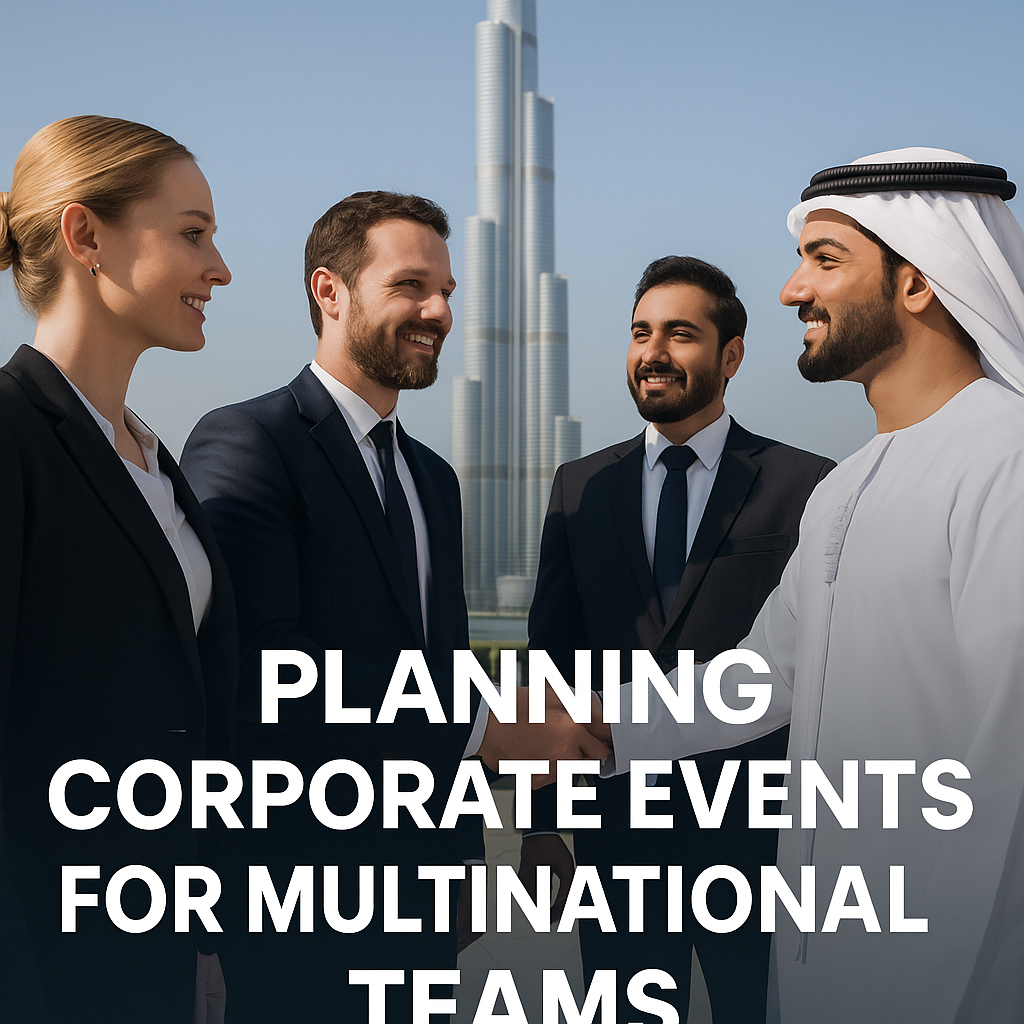
Dubai, as a cosmopolitan hub, is home to thousands of multinational corporations and international teams. Organizing corporate events in such a vibrant and culturally diverse environment demands more than just good logistics it requires strategic cultural sensitivity, clear communication, tailored experiences, and attention to the preferences of global attendees.
In this article, we explore how to plan successful corporate events for multinational teams in Dubai, ensuring alignment with business goals while respecting the cultural nuances that make these teams unique.
1. Understanding Cultural Diversity in the UAE Workplace
Dubai’s workforce includes professionals from the Middle East, South Asia, Europe, East Asia, North America, and Africa. This multicultural makeup brings richness but also potential challenges in communication, expectations, and engagement styles.
Key Considerations:
- Religious practices (e.g., prayer times, halal preferences)
- Language barriers (especially with signage, speakers, and instructions)
- Work and leisure boundaries
- Perception of hierarchy and formality
- Preferred modes of engagement collaborative or top-down?
Tip from Celestine: Start every event plan by mapping out your attendees’ regional representation, and tailor tone, format, and experience accordingly.
2. Pre-Event Planning: Localization with a Global Standard
While Dubai is an international city, not all guests are familiar with local customs and regulations. Planning should blend Dubai’s standards with global expectations.
Best Practices:
- Provide multi-language communications (Arabic, English, and others as needed)
- Send out cultural expectation guides (e.g., dress code, etiquette, local laws)
- Account for dietary preferences and religious considerations
- Schedule breaks that respect prayer times or cultural holidays
- Ensure inclusivity in every element, from entertainment to seating arrangements
3. Content & Programming: Keep It Globally Relevant
Your message should resonate across geographies, with inclusive storytelling and universally engaging formats.
Content Tips:
- Choose speakers with global experience or cultural versatility
- Incorporate interactive sessions, like multilingual panels or cross-cultural workshops
- Avoid overly local references or humor that could alienate non-native attendees
- Use visual-first presentation styles to overcome language gaps
- Include breakout sessions for networking among global teams
Celestine Insight: Use technology like live translation apps, AR subtitles, or multilingual polling tools to ensure everyone stays engaged.
4. Catering & Entertainment: Blend Local & Global Tastes
Dubai excels at offering world-class international cuisine, but it’s important to balance familiarity with cultural exploration.
Smart Catering Choices:
- Provide clearly labeled halal, vegetarian, vegan, and allergen-free options
- Mix international staples (e.g., pasta, sushi, grilled meats) with local dishes (e.g., Emirati cuisine, Arabic mezze)
- Offer non-alcoholic alternatives alongside traditional beverages
Entertainment:
- Combine local culture (oud players, tanoura dancers) with international-friendly acts (light shows, digital artists)
- Choose entertainment that’s inclusive and respectful of all nationalities and genders
5. Logistics for Multinational Attendance
From flight planning to visa processing and airport transfers, international guest logistics are a major part of planning success.
Checklist:
- Provide official invitation letters for visa processing
- Coordinate group airport transfers or VIP pickups
- Share event location maps with landmarks and instructions in multiple languages
- Organize city orientation tours for teams new to Dubai
- Include downtime or optional social outings for cultural immersion
Bonus: Work with a Dubai-based DMC (Destination Management Company) like Celestine Event to ensure all details are culturally compliant and smoothly executed.
6. Measuring Success Across Cultures
Success metrics should account for cultural differences in feedback style and engagement.
Post-Event Strategy:
- Use anonymous multilingual surveys to encourage honest responses
- Collect both quantitative (attendance, engagement rate) and qualitative (satisfaction, comfort level) data
- Offer follow-up materials tailored to different regions (e.g., localized summaries, highlight reels)
Final Takeaway: The Future of Corporate Events is Cross-Cultural
As Dubai continues to host the world’s leading multinationals, planning events for international teams will remain a critical skill. A successful event isn’t just about smooth logistics it’s about creating an atmosphere of trust, inclusivity, and shared purpose across cultures.
At Celestine Event, we specialize in creating seamless, high-impact experiences that unify global teams blending strategic goals with localized execution for a truly memorable event.
By offering inclusive experiences, multilingual content, and respecting cultural and religious practices.
Language barriers, cultural differences, and time zone coordination are key challenges.
Yes, but only in licensed venues and with culturally sensitive options provided.
Professional, culturally neutral entertainment like live music or tech-driven experiences works best.
Start planning at least 6–9 months in advance for smooth logistics and better vendor availability.